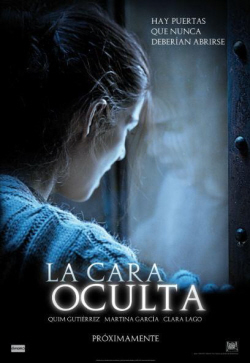 Part of what I enjoy about my gig here at CHUD is that I get exposed to films that otherwise wouldn’t be on my radar. Being afforded the opportunity to go into a film like La Cara Oculta (The Hidden Face) completely cold is an added benefit.
Part of what I enjoy about my gig here at CHUD is that I get exposed to films that otherwise wouldn’t be on my radar. Being afforded the opportunity to go into a film like La Cara Oculta (The Hidden Face) completely cold is an added benefit.
And it’s a benefit I want to extend to you as well. Before I go any further I want to point out that Oculta is an engrossing, tight thriller that’s essentially two films in one: The first about a woman who falls for a Spanish orchestra conductor as he’s being investigated for the disappearance of his former lover. The second runs parallel to the former, shedding light on said disappearance.
To say anything more would be criminal, so consider this my pre-confession before I rob a gas station. I seriously recommend the Spanish-language film La Cara Oculta – I’m giving it four stars, and if it’s playing near you (it’s currently in limited US release via Fox International) I highly suggest you go see it. It’s the opportunity to see a fresh, adult-minded thriller that manages to hold your attention the whole way through as it toys with your preconceived notions. Below the rating we’ll be ripping into this sucker, so see it and come back for some in-depth discussion. Otherwise, consider this mini-review over.
Rating:




Out of a Possible 5 Stars
~
Welcome back! Or, if you just kept reading through, I did my best and you’re robbing yourself of some mild bit of joy that comes with watching a film with such an engaging premise.

As I said above, Oculta is two intersecting narratives in one. The first, sees waitress Fabiana (Martina Garciá) falling in deep with the mysterious and heartbroken Adrián (Quim Gutiérrez): a wealthy conductor living in a mansion outside of town. Not long after they fall into bed together, we learn that Adrián is being investigated for the disappearance of his girlfriend, Belén (Clara Lago). Belén left a video breaking things off with Adrián, but she hasn’t been seen or heard from in the week since. As Fabiana spends more time in Adrián’s home, she begins to see and hear things convincing her that Belén’s still very much a haunting presence in the home. The mystery of Belén’s fate is unraveled in the entirety of the film’s second half.
Kudos to director Andrés Baiz that the second-half shift to Belén’s perspective never feels jarring. We go back in time as she moves in to begin her new life with Adrián. When the conductor’s wandering eye becomes a problem, she decides to give him a good scare. As it turns out, Belén never really leaves the house. You see, the home’s previous owner implemented a secret bunker; and it’s in this bunker that Belén (being the only resident with knowledge of its existence) hides. But in the haste of not getting caught, she leaves behind the key – trapping herself inside.
 And this is where Oculta really grabs, as we’re now forced to confront Belén’s mistakes along with her. The narrative brings us back through the first half of the film, but observed with Belén behind the bunker’s two-way mirrors. Adrián, his hear ripped out, begins falling for Fabiana. And as they make love in Belén’s bed, she’s forced to see it all – resigned to the fact that with food and time running out, she will most likely die in that bunker, voyeuristically watching her worst nightmare played out before her.
And this is where Oculta really grabs, as we’re now forced to confront Belén’s mistakes along with her. The narrative brings us back through the first half of the film, but observed with Belén behind the bunker’s two-way mirrors. Adrián, his hear ripped out, begins falling for Fabiana. And as they make love in Belén’s bed, she’s forced to see it all – resigned to the fact that with food and time running out, she will most likely die in that bunker, voyeuristically watching her worst nightmare played out before her.
Oculta‘s real power is in its ability to skillfully shift the viewer’s perspectives. Your view of antagonist and protagonist will ebb and flow seamlessly throughout. And where Adrián’s ambiguity leads you to believe he’s responsible for Belén’s supposed demise in the first half, he’ll morph into a figure worthy of your sympathy later on. It’s heavy subject matter but bent and stretched in a playful manner, making Oculta a fun story that provides the viewer every conceivable angle – creating new mysteries as it answers others.

The work of the principals is commendable as well. This is a story of three characters brought splendidly to life by three actors. Quim Gutiérrez’ Adrián is something of a cipher, never quite able to see beneath his surface. Intentional, as both women are forced to call his actions into question. Martina Garciá and Clara Lago are both terrifically effective and insanely gorgeous (a bonus considering how much of Garciá is on display in the film). Fabiana (Garciá) is exactly the girl one looks for after a hasty breakup. A little dangerous and admittedly a little easy, she’s a quick and painless rebound – until you fall in love (which isn’t hard in the context of the film). Belén (Lago) on the other hand is a stalwart, trustworthy if altogether untrusting. By the end of the film, these characters will change. But this is how they come off upon meeting them.
Oculta‘s approach to storytelling feels altogether fresh. Its ability to be experimental without jarring the viewer out of the proceedings has me wondering what else these filmmakers have in store. It’s a great ride of an adult thriller and, if you’re reading this, I sincerely hope you followed my above recommendation. That way we can all commiserate when the eventual American remake is announced.
Follow Tim on Twitter: @roboTimKelly